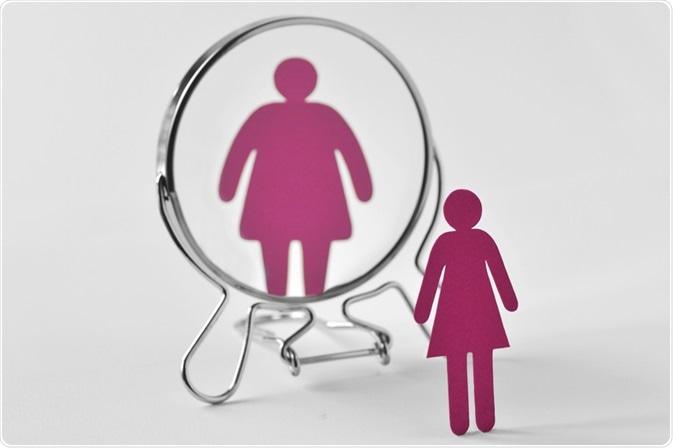The cause of anorexia nervosa is believed to be multifactorial with psychological, environmental, and biological factors believed to all play a role.
However, some people can have several risk factors without being affected, whereas other individuals who would not be considered at high risk may develop symptoms of anorexia nervosa. Therefore, the specific causes of the condition are still unclear.

Image Credit: CalypsoArt / Shutterstock.com
Psychological factors
There are certain personality and behavioral traits that are associated with anorexia nervosa and thought to be involved in the development of the condition. These factors include:
- History of depression or anxiety
- Poor handling of stress
- Excessive fear or doubt about the future
- Restraint of emotions
- Tendency towards perfectionism
- Feeling obsessive and/or compulsive
- Phobia of being fat
Environmental factors
There are several influences from the surrounding environment that can have an impact on the likelihood that an individual will be affected by anorexia nervosa.
The culture and societal norms in modern society place high importance on physical beauty and, in Western culture, a thin frame is usually considered to be more beautiful. This concept is reinforced by media messages in magazines and online sources that focus on the physical beauty and minor flaws of celebrities.
Likely as a result of these idealizations places on the female gender, young women are more likely to be affected by the disorder than men. Interestingly, men who identify as homosexual or transgender are also at an increased risk of anorexia as compared to heterosexual men.
Pressure to conform to an idealized body image can also have an impact on the health of an individual and increase their risk of being affected by anorexia nervosa. For example, people who work or participate in activities such as dancing or athletic sports face more pressure to keep their body shape in line with the accepted standards.
Anorexia Nervosa, Causes, Signs and Symptoms, Diagnosis and Treatment.
Other environmental factors may include:
- Stress at school or work
- Physical and/or sexual abuse
- Difficult family relationships
- Bullying about body weight or shape
- Stressful life events (e.g., loss of job, relationship breakdown)
In many cases, anorexia originates from a strict diet that becomes excessive and unhealthy, leading to a pathological mindset and outcomes.
Biological factors
There appears to be a familial link to anorexia and individuals with a family history of eating disorders, depression, or substance misuse in that these individuals are more likely to be affected. In fact, an individual with a close relative with anorexia is ten times more likely to suffer from anorexia nervosa than someone with no family history.
This association may be due to the presence of a genetic link that is inherited from the parents. It could also be an acquired trait from environmental circumstances, such as developing negative thoughts about body image similar to other members of the family.
The brain and hormonal level changes during puberty are also thought to be associated with anorexia nervosa, and the incidence of the condition is highest during this time. In particular, feelings of stress, anxiety, and low self-esteem are thought to trigger anorexia.
An abnormal biochemical makeup of the brain may also be involved. The hypothalamic-pituitary-adrenal axis (HPA) regulates the release of neurotransmitters such as serotonin, norepinephrine, and dopamine, which affect the mood and appetite of the individual. Individuals with anorexia nervosa often have decreased levels of serotonin and norepinephrine, suggesting that they may be involved in the pathology of the condition.
References
Further Reading
Last Updated: Apr 10, 2021